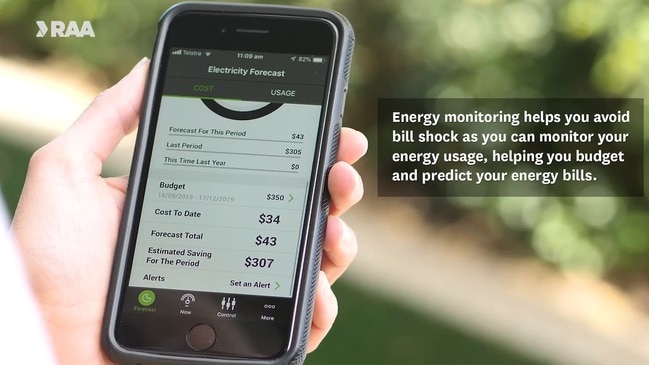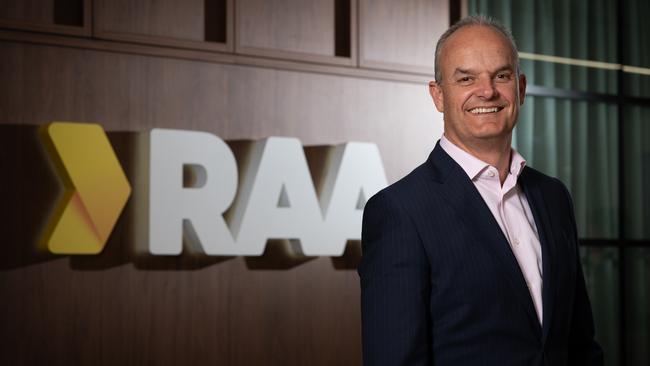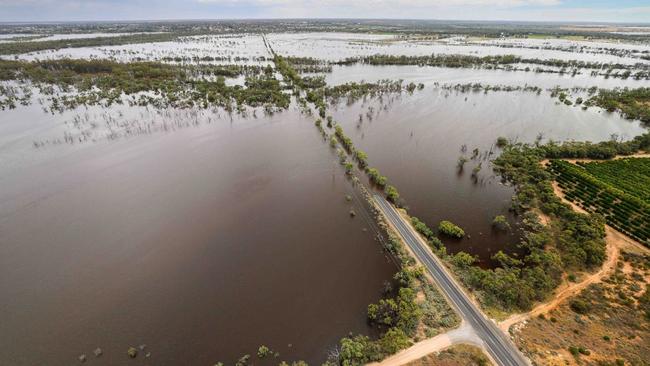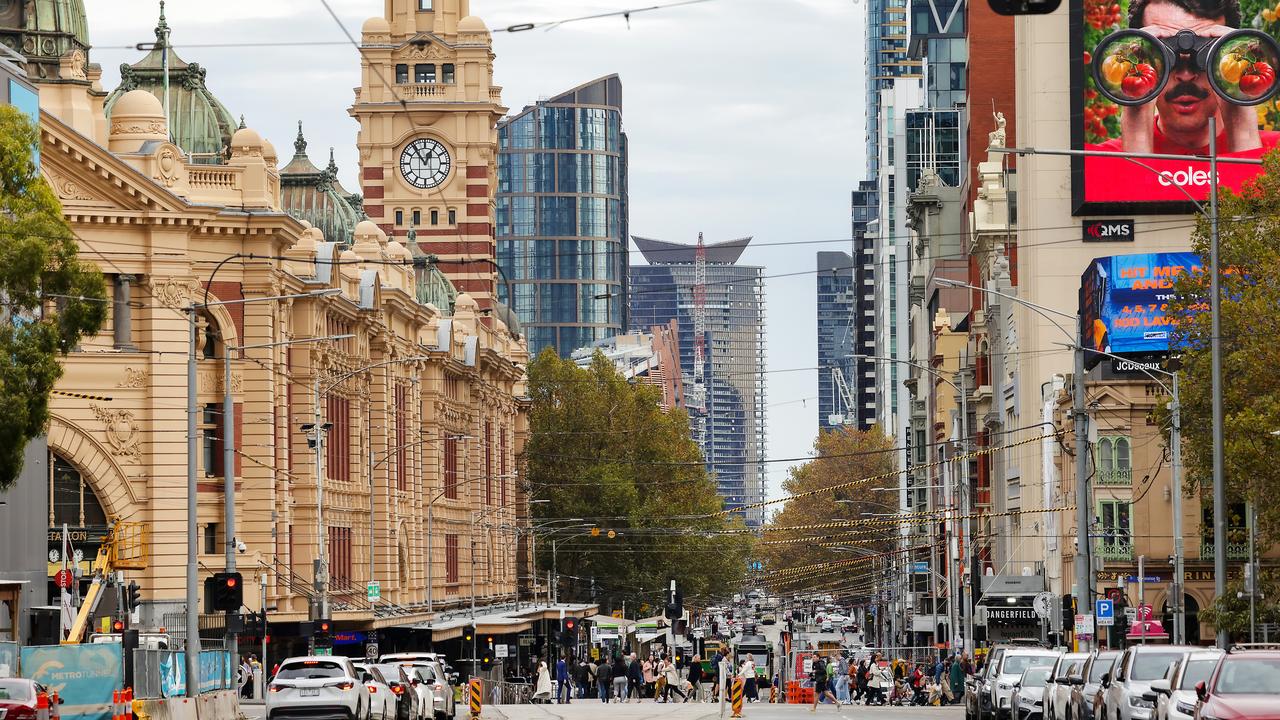RAA reports higher loss due to insurance costs, while growing member numbers past 805,000
After posting a loss of $53.9m for the past financial year on the back of a blowout in insurance costs, the RAA is promising to bounce back with a major new direction.

RAA has posted a major increase in its annual net loss on the back of a blowout in insurance costs, while also generating record revenue and growing member numbers past 805,000.
Insurance policy holders can also expect a significant increase in their premiums this financial year of about an average 25 per cent, in line with broader insurance industry increases, due to rising costs of reinsurance on world markets.
The 120-year old organisation recorded an after tax loss of $53.9m for the past financial year, up from a loss of $9.6m the previous year.
Chief executive Nick Reade said while the organisation had budgeted for a small loss due to its investment in forward-looking initiatives such as digitalisation, solar and electric vehicle plans and the like, major weather events had generated an unexpected impact.
The organisation is also paying back $25.5m to about 15 per cent of its current insurance customers, who had discounts in previous years calculated in a way which was unclear, as well as a smaller number of former customers.

Most of these refunds, which will be rolled out to customers in coming months, will be for small amounts, and arise largely from an ambiguity in the wording of some discount offers, Mr Reade said.
RAA also incurred about $30m in losses due to two weather events in South Australia, which were the major Murray River floods and a storm event in November which caused significant damage.
The organisation paid out more than 81,000 claims over the 2022-23 financial year, totalling more than $525m.
“Extreme weather contributed to a challenging year for the insurance industry as a whole,’’ Mr Reade said.
“These weather events are occurring more often, with greater impact, and are the biggest driver of increasing insurance premiums.’’
Mr Reade said the loss would not impact the underlying operations of the organisation, which was tracking strongly and looking to grow across all divisions, but particularly in areas such as travel and energy, including solar and electric vehicle infrastructure.
“Our solar and battery and travel businesses are booming, each posting record sales last financial year and are showing no signs of slowing down,’’ he said.
“We’re also making a significant investment in a digital transformation to modernise our member and employee experience.’’

The refunds which will flow to some insurance customers have arisen from a disconnect between what was contained in the product disclosure statements for some insurance products, and the wording of advertising around those products.
For example, a discount might have applied to a base policy, but not to minor add-ons.
“The premiums charged were exactly as intended,’’ Mr Reade said.
“However our communication of how discounts applied could have been clearer in some of our marketing and promotional material.
“RAA holds itself to an extremely high standard. In line with our values to do the right thing by our members, we will be refunding members including interest.
“Many refunds will be small, as little as $20, while some could be up to a few hundred dollars depending on the number and length of policies and a range of other factors.’’
Changing with the times
RAA will look a little bit different in five years’ time, chief executive Nick Reade says.
And that’s a good thing, with the organisation adapting to changes in motoring – such as the shift to electric vehicles – as well as having plenty of room to grow market share in other areas such as travel.
Many of RAA’s members, significant numbers of whom have been on the books for decades, would have known it best early on for its roadside assistance service, which is still a fundamentally important part of the 120-year-old organisation.
But RAA continues to evolve, and has been planning and investing for a future where it plays a bigger role in areas such as energy – both at home and on the road – travel, and even greater advocacy for issues its members see as important.
And with more than 805,000 RAA members in the state, Mr Reade says it has a strong sense of what’s important to the community.
RAA reported a significant net loss of $53.9m over the past financial year, which Mr Reade says is one of the realities of being an organisation with a hefty weighting to the insurance side of the business.
The loss was largely down to two major weather events in SA – a storm in November and the Murray River floods – as well as a significant number of small refunds totalling $25.5m, which will be paid back to customers who RAA has determined are owed money due to the ambiguity of wording in some of its marketing in recent years.
However the underlying operations remain as steadfast as ever, and Mr Reade said the team is energised about areas such as solar panels and storage batteries, its rollout of electric vehicle chargers across the state, and the chance to grow its travel business.

While RAA is a big player in the SA insurance market, with about a 30 per cent share, it’s a small player in travel. But Mr Reade said its strong member focus lends itself to providing good service – and hopefully an expanded business – in this sector.
Mr Reade himself is fairly new to the top role, joining RAA in August 2022, and has refreshed his senior management team, bringing in James Galdes as chief technology officer, Michael Healy as chief marketing officer, Ben Owen as chief strategy officer, Laura Schonfeldt as chief people officer and Susan Crago as chief governance and risk officer, and promoting Tara Page to RAA Insurance chief executive.
Mr Reade said the team was excited for the future, and there was a lot to look forward to both for members and staff.
“We are going to diversify our revenues,’’ he said. “We’re looking at new businesses at the moment. Our brand is so powerful, it’s so trusted, we know it can stretch into other areas. One that we’ve already flagged is energy. We’ve got solar and battery going gangbusters already but we know we can go behind the meter and actually help households understand their energy consumption.’’
Mr Reade said it was a fast- moving area, especially when the impact of electric vehicles was factored in, and RAA could help demystify issues such as how EVs and their batteries might interact with the home.
As part of this energy focus, RAA is rolling out a 140-site network of EV charging stations across the state, in partnership with the state government, which will help reduce range anxiety for current and potential EV owners.
On the travel side, Mr Reade said RAA had a 65-year history in the sector, but perhaps hadn’t had the conviction to really grow that part of its business.
Mr Reade said this would be growing very much with members in mind, providing good service, rather than discounted travel offers competing on price.
“I think our proposition is largely driven by travel consultants talking to members and supporting them through and being there when they have a problem,’’ he said.
“Yes, we want to have some really cool digital tools, but one of our differentiators is that face-to-face proposition.’’
Underpinning all of this is a digital transformation which will ensure members have the ability to interact with RAA on their terms, whether that be face-to-face or via a technological solution, Mr Reade said.
“One of the things that I’ve tried to do – we’ve got a very focused member experience culture within RAA, but I’ve tried to even take that up a notch.
“Internally, we have a sort of a value around member obsession.
“But I’m almost encouraging the team to go a bit further.’’




